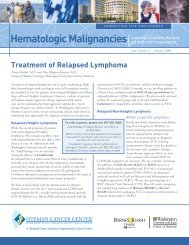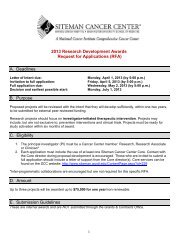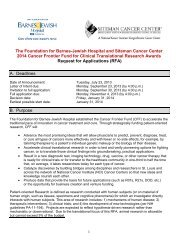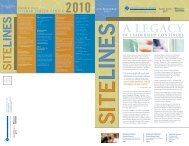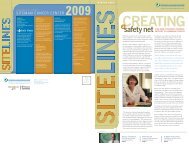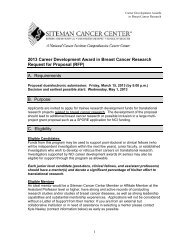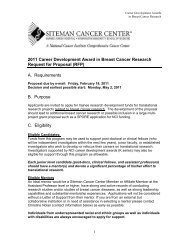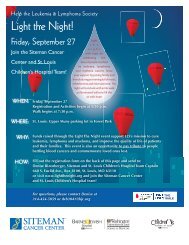Planting the Seeds of Prevention - Siteman Cancer Center
Planting the Seeds of Prevention - Siteman Cancer Center
Planting the Seeds of Prevention - Siteman Cancer Center
Create successful ePaper yourself
Turn your PDF publications into a flip-book with our unique Google optimized e-Paper software.
Mat<strong>the</strong>w Kreuter, PhD, MPH, and<br />
colleagues Debbie Pfeiffer, MA,<br />
left, and Deidre Griffith, MPH,<br />
review some <strong>of</strong> <strong>the</strong> customized<br />
publications produced by <strong>the</strong> Health<br />
Communication Research Laboratory<br />
at Washington University’s Brown<br />
School <strong>of</strong> Social Work.<br />
6 The Alvin J. <strong>Siteman</strong> <strong>Cancer</strong> <strong>Center</strong><br />
On Target<br />
Communications <strong>Center</strong> Propagates Powerful Messages<br />
The publications created by Mat<strong>the</strong>w Kreuter, PhD, MPH, and his colleagues — welldesigned<br />
magazines, colorful children’s books and heavily illustrated brochures —<br />
could be <strong>the</strong> work <strong>of</strong> an ad agency or marketing firm. But <strong>the</strong>y are so much more.<br />
The work comes from <strong>the</strong> Health Communication Research Lab (HCRL) at Washington<br />
University’s Brown School <strong>of</strong> Social Work, which is led by Kreuter, and <strong>the</strong> publications share<br />
a <strong>the</strong>me — <strong>the</strong>y all promote healthy choices: cancer screening, a balanced diet and regular<br />
exercise. More subtly, <strong>the</strong> publications are similar because <strong>the</strong>y are intended for an African-<br />
American audience. Most importantly but perhaps least visibly, all are based on rigorous<br />
science. The messages, images and delivery methods have been shaped by research to increase<br />
<strong>the</strong>ir reach and effectiveness.<br />
The work is directed at African Americans for good reason. “For almost every type <strong>of</strong><br />
cancer, African Americans suffer disproportionate rates <strong>of</strong> disease, higher death rates and<br />
shorter survival times,” explains Kreuter, co-leader <strong>of</strong> <strong>the</strong> prevention and control research<br />
program at <strong>the</strong> <strong>Siteman</strong> <strong>Cancer</strong> <strong>Center</strong> at Barnes-Jewish Hospital and Washington University<br />
School <strong>of</strong> Medicine. His efforts are designed to help eliminate those differences.<br />
Kreuter, a pr<strong>of</strong>essor in <strong>the</strong> Brown School, and his team have devised experiments to<br />
shape and evaluate <strong>the</strong>ir cancer-prevention messages and delivery systems. In October<br />
2008, a five-year, $8.6 million grant from <strong>the</strong> National <strong>Cancer</strong> Institute was awarded to<br />
support <strong>the</strong> work and establish <strong>the</strong> HCRL as one <strong>of</strong> only five <strong>Center</strong>s <strong>of</strong> Excellence in<br />
<strong>Cancer</strong> Communication Research nationwide.



